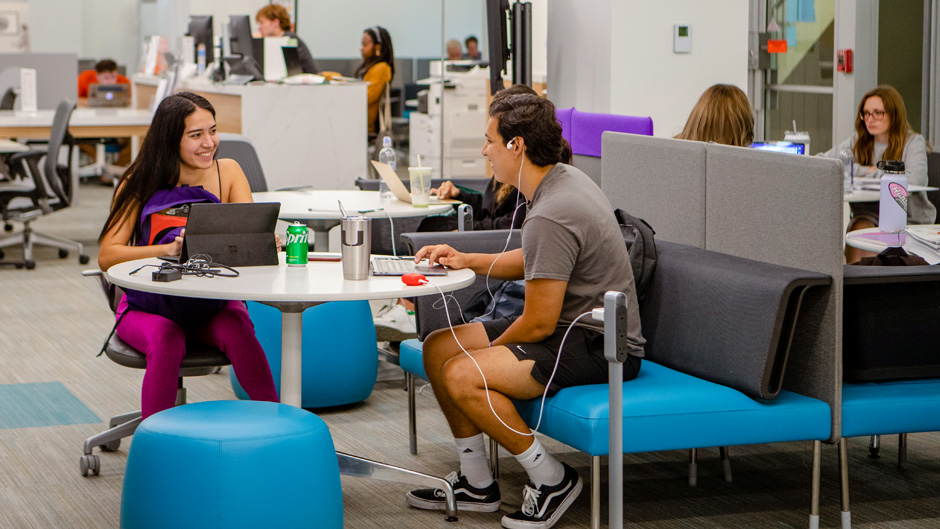It’s finals week at the University of Miami. With looming deadlines and lengthy exams, students often experience increased levels of stress during this time.
“During the final weeks of the semester, we remind our students to take care of themselves and each other,” said Patricia A. Whitely, senior vice president for student affairs.
“The Division of Student Affairs and our campus partners support our students’ mental and physical well-being year-round. We encourage students to utilize these resources, reach out for support, and attend our programs,” she said. Whitely noted that programs like ‘De-Stress Fest’—hosted by the Student Government, the Association of Greek Letter Organization, and the Counseling Outreach Peer Education (COPE)—that is being held on Tuesday, can help students focus on their wellness and excel both in and out of the classroom.”
While final exams week can induce increased pressure, the following lists a few pieces of advice and resources that are available on campus to help students successfully get through the last stretch of the semester.
Organize assignments.
Having a plan to tackle assignments can help students focus on the assignments at hand, said Sai Sophia Hon, a doctoral practicum extern at the Counseling Center. Creating a study schedule and preparing materials in an organized fashion helps alleviate the stress of a busy schedule.
“Divide your study materials or paper into manageable chunks to help you study consistently and effectively,” she said. “Find a study strategy that works well for you—such as finding a study group, preparing flashcards, or putting together a lecture on the material you’re struggling with.”
Practice mindfulness.
“During exam times, practicing mindful awareness can help us stay focused on the task at hand and to do so in a kind, supportive manner,” said Kelly Miller, associate dean of learning and research services at the Otto G. Richter Library. “Training ourselves to be in the present moment without judgment helps activate our parasympathetic nervous system, which helps us rest and care for ourselves with less stress; improves neuroplasticity; and increases creativity, as well.”
Mindfulness involves cultivating our human capacity for present-moment awareness with a kind and non-judgmental attitude, she added. Simple ways to practice mindfulness include taking a few deep breaths accompanied by long exhalations, grounding one's attention in physical sensations in the hands or feet, remembering someone who has helped and supported you in life, or recalling a peaceful place in nature, such as a favorite tree or mountain that is associated with inspiration and resilience, Miller suggested.
Students looking for a quiet space to practice mindful meditation can book a meditation room through the University Libraries.
Move the body.
A healthy body is essential to success during stressful times. Taking steps to manage well-being can help limit the negative effects of tension on the body.
“It’s really important, especially during times of increased stress, to tune in to your body’s natural state. Be aware of how you typically feel and act during less stressful times,” said Aidan Wells, a health educator with the Department of Wellness and Recreation.
To mitigate levels of stress, Wells suggested simple steps like getting regular physical activity, taking a yoga class, practicing relaxation techniques, and setting aside time for hobbies, such as reading a book or listening to music to relax. To get moving, students can attend a group exercise class at the Wellness Center.
In addition to keeping the body moving, nourishing it is equally as crucial, she added.
“Take advantage of the on-campus dining options. Why have the added stress of cooking or worrying about what restaurants deliver, when you can find healthy, balanced meals at the dining halls,” Wells said.
Prioritize quality sleep.
Studies show that college students who pull all-nighters perform worse than those who get proper sleep. When it seems as if there aren’t enough hours in the day, it can be tempting to sacrifice those extra hours of sleep to get work done.
“If you can’t commit to increasing the amount of sleep you’re getting, at least do everything you can to improve the quality of your sleep,” Wells said. “Make sure that you are sleeping in a cold, dark, and quiet environment, and limit electronic use in the 30 minutes before going to sleep. If you can do this, then you will wake up feeling more well-rested overall.”
Participate in stress-relief activities on campus
Participating in simple activities like coloring, petting a dog, or squeezing a stress ball, all of which are available at the University Libraries, can help alleviate stress during finals.
On Tuesday, students can visit the Lakeside Patio from 12 p.m. to 2 p.m. for “(De)Stress Fest” to indulge in stress-relief activities.
Know when it’s time to ask for help.
Students should be aware of how they typically feel and act during less stressful times.
Physical manifestations of stress include, but aren’t limited to, headaches, difficulty sleeping, upset stomach, change in eating habits, social withdrawal, outbursts, and substance misuse.
If a student starts to feel themself experiencing these symptoms, it may be time to take a step back. Wells and Hon agree that students need to stay alert to how they feel, so that they can notice these signs before they become unmanageable.
If students have taken steps to control stress, but symptoms continue, it may be time to consider seeking professional support, such as the services available at the Counseling Center. Schedule a brief assessment appointment to engage in problem solving or to be connected with therapy and psychiatry options.
Hon also suggests students utilize WellTrack. It’s a free online self-directed therapy experience that includes structured sections on managing depression and anxiety, tools and resources to deal with problematic issues, relaxation exercises, and simulated situations to deal with specific anxieties, including public speaking in anticipation of presentations.
Additional resources for students
- Academic Resources
- ’Canes Care for ’Canes
- Counseling Center
- Dining Options
- Libraries
- Student Affairs
- Wellness and Recreation

